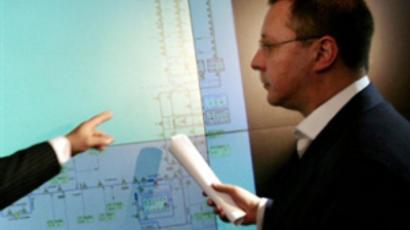Friday's Press Review

This Friday Russian newspapers quote world-famous Russian politicians on Obama’s Presidency, explore the state of Russia-U.S. relations and interview a former national-level crisis manager on the current economic crisis.
ROSSIYSKAYA GAZETA publishes an article by the former President of the Soviet Union, Mikhail Gorbachev, dedicated to the beginning of Barack Obama’s Presidency. Gorbachev writes that many things were totally unprecedented about the recent U.S. electoral campaign and its results.
The article reflects on the public campaign, and in particular the role of a younger generation of Americans on an unprecedented scale, and its outcome. The election of Obama became a milestone in the progress of freedom away from the legacy of slavery and racism. It has led to unprecedented support and trust in Obama by Americans, and stimulated unprecedented global interest, based on hopes for change in U.S. policies, with unprecedented hopes from around the globe.
The former Soviet President writes that if the support of the American public gave Obama the Presidency, the hopes and expectations bring him a burden which he will have to bear, along with his team.
Gorbachev says that the current economic problems faced by the U.S. and the world cannot be solved single-handedly – they require multi-lateral cooperation. The very model of ‘Washington consensus,’ or the attempt to dominate the global economy from a single centre has become totally discredited, says the former Soviet president. He continues, saying that a new model must emerge, and that the new model needs to be based on multi-lateral cooperation. He adds that even with the today’s wide-spread anti-American sentiment, everyone in the world still understands the role of the U.S. and is generally ready to cooperate with it.
But is America ready for such cooperation, asks Gorbachev? He quotes the inaugural speech of Barack Obama who noted that the world has changed, and that the U.S. has to change with it. To do that, continues Gorbachev, America has to commission an honest and realistic analysis of the global situation. Analysis that, he says, hasn’t been conducted for nearly two decades while arrogance and notions of ‘America almighty’ and ‘The American Century’ prevailed.
The election, says Gorbachev, has shown that the power of America is not in empire-building ambitions or daring military expeditions but in its ability to change, to own up to, and overcome mistakes of the past. He lists the most important world-level issues which cannot be resolved without cooperation between the U.S. and the rest of the world, and concludes:
‘Many must now be thinking of the words spoken by the U.S. president about the beginning of the ‘Era of Responsibility.’ Its features may be still dim in our eyes, as well as in his. But one thing is evident: we are standing at the boundary of a new epoch, and only together we can surmount the road to the new world.’
VREMYA NOVOSTEI reports from the launch of a new book by another former leader of Russia – ex-Minister of Foreign Affairs, ex-Prime Minister, and academician Evgeny Primakov. The book is titled: ‘The world without Russia? Where political shortsightedness can lead you.’ The book, says the paper, is about the dangers of a uni-polar world dominated by one country, and the benefits of a multi-polar world where there are multiple power centers, one of which, Russia, is often intentionally neglected by the West, mostly to its later regret.
The paper quotes Evgeny Primakov as saying, in his address to the gathering, that new perspectives open for the world with the election of Barack Obama as U.S. president. He adds that a new power is emerging in the U.S., and that we must use this opportunity, conducting active negotiations in every sphere – despite knowing well that it is not easy to negotiate with the United States of America.
The book, says the paper, calls for closer and more active cooperation between Russia and the U.S. in many spheres where it can be beneficial to the both sides and to other nations as well – offering, as an example, the problems of the Middle East which cannot be solved without Russia – U.S. engagement.
The paper says that the event turned out to be a great success and that some guests, even the VIPs, had to sit on the floor, as the room was packed beyond capacity, and that none of them complained.
NEZAVISIMAYA GAZETA’s Foreign Desk Chief, Artur Blinov, writes that the first days of the Obama administration have shown that the new U.S. President means his words, spoken during the electoral campaign, and in his inauguration speech, but has first addressed those problems where there is a consensus, at least among his own team. That is what happened with the closure of the Guantanamo prison and the freezing of the White House staff incomes.
However the issue of a swift withdrawal from Iraq, touched upon on the first day, will have to stay on the back burner for a while, says Blinov. He explains that on that issue there still is no consensus, even among the military, with many field commanders thinking that pulling out too quickly may cause chaos and bloodshed.
The same, says Blinov, will happen with relations with Russia: in Obama’s administration there are people with such differing views that for them to agree among themselves would definitely take time. The writer adds that hopes that President Obama will visit Moscow very soon, are mere wishful thinking. But he adds that, such meetings are always preceded by talks between Foreign Ministers, noting that a meeting between Sergey Lavrov and Hillary Clinton may happen during one of the multi-lateral summits or meetings in the near future.
MOSKOVSKI KOMSOMOLETS interviews Egor Gaidar, Director of the Institute of Transitional Economy, and former Deputy Prime Minister during the troubled early 1990s, about the possible effects of the global economic crisis on Russia. Gaidar says that he doesn’t see any signs of a catastrophe. He says, the recession is going to be tough, but Russia is much better prepared now than the Soviet Union was when oil prices plummeted last time, in the 1980s.
Gaidar says, the deeper integration of modern Russia into the world market, compared with the soviet union’s final decade, is not that significant if we are talking of world-level economic crises. He notes that if microeconomic life then was totally regulated by the government and isolated from any outside influence, the macroeconomic sphere, especially through exports and imports, was as dependent on the fluctuations in the global market as today. Nothing played a bigger role in the collapse of Soviet economy than the sharp drop in oil prices in the 1980s, says Gaidar.
Evgeny Belenkiy, RT.














